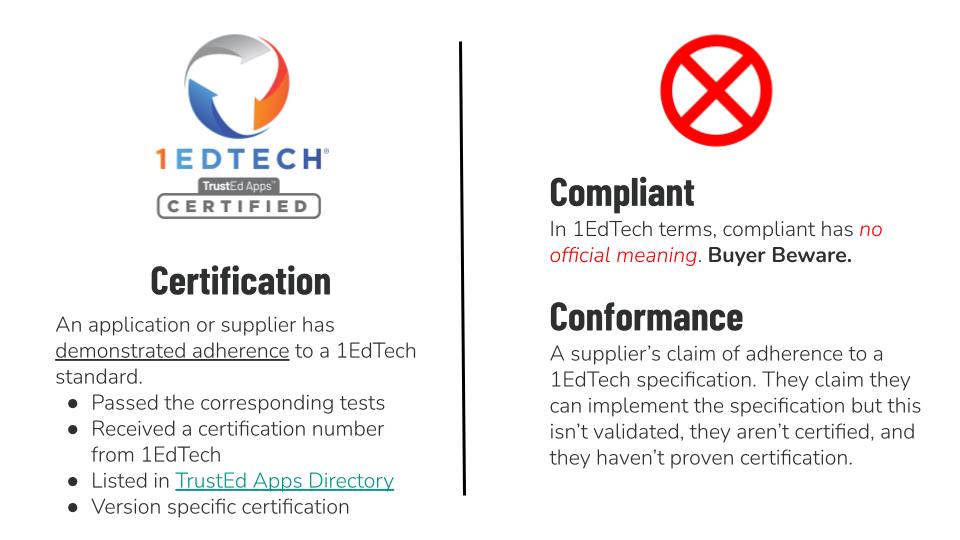1EdTech Glossary

Key terms and vocabulary.
A | B | C | D | E | F | G | H | I | J | K | L | M | N | O | P | Q | R | S | T | U | V | W | X | Y | Z | ALL
1 |
|---|
1EdTech Product CertificationMeans that an application or supplier has demonstrated adherence to a 1EdTech standard, has passed the corresponding tests, and has received a certification number from 1EdTech. This results in the product being listed in the 1EdTech Product Directory 1EdTech offers two types of certification: 1. Certification for edtech Products against 1EdTech technical standard specifications.
2. Professional certification for individuals. (Members only: https://www.1edtech.org/program/tacl) | |
A |
|---|
API EndpointsAPI endpoints are URLs or digital locations that perform a service. Certified CASE Providers offer specific API endpoints that accept a CASE-formatted package and returns data so the client can "ingest" or consume a CASE Framework. More simply put, the API endpoint is your digital bridge to connect you to a CASE Framework, so you can upload it into your system (for example, an LMS.) | |
APIPAPIP is the abbreviation for Accessible Portable Item Protocol, a standard developed by 1EdTech. See the definition for the Accessible Portable Item Protocol for more information. | |
ARIA | |
Access for All Personal Needs & Preferences (AfA PNP)This 1EdTech standard is a part of the 1EdTech Access for All work. It defines a language for describing a learner’s needs and preferences with respect to how the learner can best interact with digital resources, including the configuration of assistive technologies. This standard is an important component of the 1EdTech e-assessment standards: APIP and QTI. Version 2 of the Access for All Digital Personal Needs & Preferences (AfA DRD) has been released as ISO Standard [ISO/IEC 24751-2:2008]. | |
AccessForAll AccessForAll® is a standard developed by 1EdTech Consortium. AccessForAll provides accessibility to users by matching user needs and preferences with the characteristics of available resources. These preferences include information about how the user can interact best with a computer, not convey information such as medical history. The user's need for specific kinds of content, display features, or control mechanisms is recorded. This information is used to select or request appropriate adapted content, configure a visual display for easy reading, or locate resources that match the user's control requirements. For more information, see 1EdTech's Accessibility ProjectGroup Activities 1EdTech App Note: Enhancing Accessibility through 1EdTech Standards. Higher education institutional members may be interested in the Accessibility Innovation Leadership Network; for more information see Higher Ed Innovation Leadership Networks | |
Accessibility
View the 1EdTech Accessibility Rubric for Suppliers. Results of supplier self assessments can be viewed in the TrustEd Apps Management Suite for 1EdTech Institutional Members. Learn more about this work: Accessibility | |
Accessible Portable Item ProtocolAccessible Portable Item Protocol® — 1EdTech has developed two tightly connected standards that the assessment community worldwide is using to improve learning, Question and Test Interoperability® (QTI®) and Accessible Portable Item Protocol® (APIP®). APIP offers students access to digital assessments on the first day of class that is customized to their personal learning needs with minimal or no modifications necessary so that teaching can proceed without interruption and results are transmitted faster than with paper-based assessments. APIP is a solution for authoring and delivering test items to students in a way that supports the consistency of the delivery of every item. The newer QTI 3 standard incorporates many of the concepts of the APIP standard into a more integrated solution. For more information see 1EdTech's Accessibility Project Group Activities and the 1EdTech App Note: Enhancing Accessibility through 1EdTech Standards. Higher Education Institutional Members may be interested in the Accessibility Innovation Leadership Network; for more information see Higher Ed Innovation Leadership Networks. Learn more about this work: Learn more about this work: https://www.imsglobal.org/activity/qtiapip | |
Accessible Rich Internet Application (ARIA)The Accessible Rich Internet Applications Suite, defines a way to make Web content and Web applications more accessible to people with disabilities. It especially helps with dynamic content and advanced user interface controls developed with HTML, JavaScript, and related technologies. Without WAI-ARIA certain functionality used in Web sites is not available to some users with disabilities, especially people who rely on screen readers and people who cannot use a mouse. WAI-ARIA addresses these accessibility challenges, for example, by defining ways for functionality to be provided to assistive technology. With WAI-ARIA, developers can make advanced Web applications accessible and usable to people with disabilities. | |

